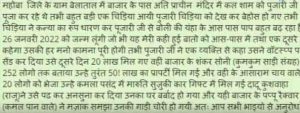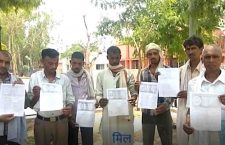A temple. A pujari ji. A shape-shifting bird. The promise of prosperity.
These were the elements of a What’s App message that was shared over 10 groups with 100 to 150 members each, across the Belatal kasbah of Mahoba district in Bundelkhand, Uttar Pradesh. Structured in the usual ‘Send this to five friends and watch your luck turn overnight’ vein, the message was different in one interesting aspect: It listed the names of actual people who had so far benefitted from the good fate promised in the text.
We decided to track down these so-called recipients and those who forwarded it umpteen times. Such as Nikhil the local stationery shop owner who sent it off to his phone book because “comedian tha”, meaning he found it funny. That, he claims, was his only reason. What about the fulfilment of your heart’s desires?, we asked, which the message claims to grant. “I’ve never had any manokaamnas,” replied Nikhil, adding, “If God wants to give me something, he’ll give it to me anyway.”
Shankar Soni, Kumkum sari shop owner, received 50 lakhs upon forwarding the message to 252 people – according to the message, that is. Soni was in no mood to deconstruct it when we went visiting one morning, before his shop had opened up. “These are all just silly rumours, there’s nothing in them,” he says. “No, I haven’t got any money. People do this for timepass.”
Devendra, also a Belatal resident, labels the text “farzi (fake)” at once, adding, “There’s no such pujari in all of Belatal.” Devendra read the message on the What’s App group Bundelkhand Media, of which he is a member even though he’s not a media person, but that’s just a technical detail in Mahoba. “Haan, yeh post padhi hui thi uspar”, he said, adding that he immediately termed it bunkum. “I don’t believe in all this even 1%. In fact, I make it a point to comment on the group, telling everybody it’s a hoax.”
When we went to visit local kirana shop owner Irfan, cited as the recipient of a brand new car in the message, we were greeted by an amused man with a “comedian” story of his own. “When my brother, Ikram bhai, got married, he was given an Alto car as part of his dowry. And in the message, it says he got it because he forwarded the message.” Ikram’s wedding, we should also add, was two-and-a-half years ago. Irfan, whose smile never once leaves his face the entire time we spend interviewing him at his dukaan, also shares another story, “My neighbour’s car was recently stolen. And in this message, it says that his car was stolen because he didn’t forward it! So, somebody’s just connected all these events and built them into the message.” Irfan added, not surprisingly, that he had “0%” faith in such texts.
In a land where cybercrimes and the laws around them have a fuzzy understanding at best, how the machinery is meant to react against fake news is not a topic with too many takers, even with the upholders of the law. Mahoba S.P. N. Kolanchi told us that he’s been keeping track of “repeat and regular offenders”, but that his efforts are more aligned with the messages that are meant to incite communal violence. “Jaanch phir bhi karenge (We will examine this also)”, he said.
Meanwhile, birds die and turn into apsaras in the name of timepass, disruption, mild dissonance, as Belatal hums along.
– Pooja Pande
This Khabar Lahariya article first appeared on Firstpost.


